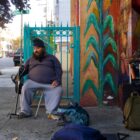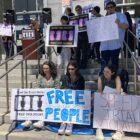 |
| Sean Elsbernd, right, was one of two supervisors to vote against a revised budget passed Tuesday that restored $650,000 to the office of Public Defender Jeff Adachi, left. Photo by Patricia Decker/The Public Press. |
A concerted last-minute campaign by the San Francisco public defender to restore previously cut funds succeeded as the Board of Supervisors passed a revised $6.7 billion budget Tuesday.
The budget was the culmination of months of wrangling among agencies and political factions that pitted, most audibly, social services and public health agencies against public safety to bridge an unprecedented funding gap of more than $400 million.
Winners Tuesday also included public financing of political campaigns, children’s services and the district attorney.
The police department’s top brass, the convention center, the ballet, the opera and a nonprofit theater all lost out, as their budgets were gouged to balance the city’s ledger.
The 9-2 budget vote came after months of adjustments and political trading that left few completely satisfied.
Supervisors also fought among themselves on a series of amendments intended to wrest power in future budgeting from the mayor.
Legal funding shuffle
The move by Supervisor Ross Mirkarimi to re-fund the public defender was hotly debated. Public Defender Jeff Adachi’s office won back $650,000, and district attorney Kamala Harris also got an additional $250,000. That money was raised by extracting $900,000 from the $8.3 million indigent defense fund of the Superior Court.
The loudest dissenting voice in this switch belonged to Supervisor Sean Elsbernd, who proposed to split the money equally between the two offices, but his idea failed.
Through a bit of political theater, Adachi defended the restored funding by promising that it would provide high-quality legal help to poor defendants. “There’s a big difference between the assembly-line justice and the kind of justice that we try to provide here in San Francisco,” Adachi said, as his staff wheeled in boxes of files to illustrate how a single attorney is already required to handle about 220 cases.
Police downsized
A motion by Supervisor Chris Daly, supported by Mirkarimi, cut positions from the police department’s upper management. The police lost one deputy chief and two commanders.
The supervisors also redirected revenue from the hotel tax that was originally intended for the rehabilitation of the Moscone Convention Center. A small piece of the tax, about $1 million, will go toward public campaign financing. All told, as much as $2.3 million was set aside for campaigns, though about $1 million was placed in reserve.
Jeremy Pollock, an aide to Mirkarimi, said that $2.3 million “is what we calculated as the baseline amount we need to put into the public financing fund, to be on pace to have enough money for the mayor’s race” in 2011, as well as the supervisorial races next year.
Additional cuts to the General Fund will be felt at the city ballet, opera and American Conservatory Theater. Those cuts, about half a million dollars, were proposed by Mirkarimi and passed 6-5. That sum will back-fill children’s services, including a homeless shelter for youth.
But the uncertainty of budgeting at a time when the state budget was also in question made it hard for the city to be sure its plans were final. At one point, Mirkarimi cautioned against assuming that the worst was over, instead saying, “we need to be on our toes to safeguard further” state or city budget downturns. He failed to create a $9.7 million reserve fund for the Asian Art Museum and the California Academy of Sciences.
Before the vote on that measure, Supervisor John Avalos stressed that the board had “already really pushed the envelope” on negotiations with the mayor “quite close to the very edge.” Mirkarimi was adamant that some money be set aside: “I cannot vote for this budget if we do not have reserves,” he said.
After Mirkarimi’s motion failed, Supervisor David Campos stepped in with a different reserve fund proposal, which passed 7-4. It placed $45 million from the salaries and benefits of the largest seven General Fund departments on “budget committee reserve” — meaning city supervisors could dip into it in an emergency. The fund includes $11.9 million from police and $11.8 million from the Department of Public Health.
Of tourists and geese
In an effort to protect tourism and the convention center — referred to by board President David Chiu as “the goose that lays the golden egg” — Supervisor Bevan Dufty motioned to restore $800,000 to the convention facilities. Dufty said poorer facilities would mean fewer conventions and more empty hotel rooms.
“It has a major ripple effect,” he said. “It’s fundamentally important to our economy.”
After hours of tense debate and the passage of numerous amendments, the budget passed, with only Elsbernd and Carmen Chu dissenting.
Avalos, chair of the Budget and Finance Committee, captured the sentiment of the afternoon when he summed up the months of work spent refining the budget: “It’s not ideal, it’s not perfect, but I think it’s the best that we can do.”
Reform agenda flops
The board voted down, 7-4, a proposal by Daly to reform the way budgets are implemented after they pass. His amendment would have allowed the board to force Mayor Gavin Newsom to spend so-called “add-back” money that comes from the board, and prevent unchecked mid-year budget cuts. The amendment offended Newsom, who called it the worst piece of legislation he had ever seen.
In response, the board finally passed another measure, by Avalos, that requires the mayor to return to the board with a formal plan to strip funds from any agency. But Daly said the measure was toothless.
Typically the administration releases its budget on June 1, proposing cuts. This year, the proposed budget was heavily criticized for deeply cutting social services.
Over the next month, the board creates a restoration or “add-back” list of organizations they want to save. The supervisors were able to wrestle $43 million in add-backs to social services this year.
In the past, the mayor has at times chosen to simply not spend money on these organizations, or to cut them in unchecked mid-year cuts. The board has no way of preventing the mayor from doing either.
Allies fail to force mayor
The self-identified progressive majority of the board has divided on how to address budgetary reform and this perceived imbalance of power. “They are splintering, not just on a question reforms, but on a question of strategy,” Mirkarimi said.
Before the vote, Daly called his proposal “measured.”
“I believe it works well with the existing restrictions of the charter,” he said, addressing his colleagues. “It is crafted to allow a majority of the board to have power. If you don’t like this, please propose something that you think is better.”
The most notable “no” vote was Avalos, a former Daly staffer. Daly, who paced around the room and exchanged words with Avalos, was visibly angered by the vote.
“They blindsided me,” Daly said.
Although Avalos’ earlier amendment, regarding how the city addresses potential losses of state and local revenues, passed, it requires the good faith of the mayor. Last year’s unilateral midyear cuts by the mayor left some supervisors skeptical about overcoming political differences.
“Goodwill must be reciprocated” and previous failures demonstrated a lack of follow-through, Mirkarimi said.
Daly then asked to be removed as chair of the Rules Committee and vice chair of the City Operations and Neighborhood Services Committee. In a letter he passed around the chamber, Daly wrote, “I feel that my efforts to serve the people of San Francisco and progressive politics are better suited in my other official capacities.”









